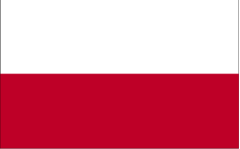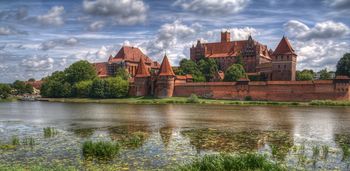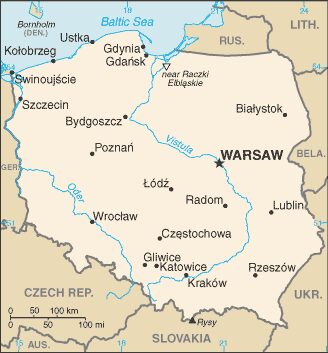Poland: Difference between revisions
imported>Richard Jensen (these are "notes" (with additional info) -- not bare-bones "references") |
John Leach (talk | contribs) m (Text replacement - "World Heritage Site" to "World Heritage site") |
||
| (6 intermediate revisions by 3 users not shown) | |||
| Line 1: | Line 1: | ||
{{subpages}} | {{subpages}} | ||
[[Image:Flag of Poland.gif|thumb|240px|The Polish flag consists of two equal horizontal bands of white (top) and red.<ref>The colors are somewhat problematic since there is no consensus what are the "correct" colors for the computer screen; this version comes from the ''CIA World Factbook''. Compare with pictures proposed by Polish Ministry of Foreign Affairs [http://www.poland.gov.pl/files/Flaga_polska.gif] and the presidential website.[http://www.prezydent.pl/x.node?id=70 | [[Image:Flag of Poland.gif|thumb|240px|The Polish flag consists of two equal horizontal bands of white (top) and red.<ref>The colors are somewhat problematic since there is no consensus what are the "correct" colors for the computer screen; this version comes from the ''CIA World Factbook''. Compare with pictures proposed by Polish Ministry of Foreign Affairs [http://www.poland.gov.pl/files/Flaga_polska.gif] and the presidential website.[http://www.prezydent.pl/x.node?id=70].</ref>]] | ||
'''Poland''' ([[Polish language|Polish]]: ''Polska''), officially the ''Republic of Poland'' (Polish: ''Rzeczpospolita Polska''), is a large Slavic nation in [[Central Europe]]. Its history stretches 1000 years, with interruptions when it was controlled or even divided up by powerful neighbors. It is a member of the European Union and NATO. | |||
==Geography== | ==Geography== | ||
[[Image:Pol-cia.jpg|thumb|350px|Poland in 2007.]] | [[Image:Pol-cia.jpg|thumb|350px|Poland in 2007.]] | ||
Poland is located in Central Europe and occupies a total area of 312,679 square kilometers. It is bordered by [[Belarus]], the [[Czech Republic]], [[Germany]], [[Lithuania]], a [[Russia]]n exclave [[Kaliningrad Oblast]], [[Slovakia]], and [[Ukraine]]. Poland is predominantly open plains, with the natural borders of the [[Carpathian Mountains]] to the south and the [[Baltic Sea]] to the north. | Poland is located in Central Europe and occupies a total area of 312,679 square kilometers. It is bordered by [[Belarus]], the [[Czech Republic]], [[Germany]], [[Lithuania]], a [[Russia]]n exclave [[Kaliningrad Oblast]], [[Slovakia]], and [[Ukraine]]. Poland is predominantly open plains, with the natural borders of the [[Carpathian Mountains]] to the south and the [[Baltic Sea]] to the north. | ||
==Language, Religion, Culture== | ==Language, Religion, Culture== | ||
Religion was a mainstay of Polish identity for a thousand years. It was a refuge from Communist rule, and before that an act of defiance against Prussians and Russians. As the rest of Europe secularized in the late 20th century, the Catholic faith grew stronger in Poland, symbolized by the selection of Karol Cardinal Wojtyła, Archbishop of Kraków, as Pope [[John Paul II]] in 1978 | Religion was a mainstay of Polish identity for a thousand years. It was a refuge from Communist rule, and before that an act of defiance against Prussians and Russians. As the rest of Europe secularized in the late 20th century, the Catholic faith grew stronger in Poland, symbolized by the selection of Karol Cardinal Wojtyła, Archbishop of Kraków, as Pope [[John Paul II]] in 1978. By the late 1980s, a third of all priests ordained in Europe were from Poland.<ref> Stanislaw Gomulka and Antony Polonsky, eds., ''Polish Paradoxes'' (1991), pp 237-60</ref> | ||
==History== | ==History== | ||
{{Image|Malbork Castle, 2010.jpg|right|350px|Poland is home to thirteen [[World Heritage sites]] as recognised by [[UNESCO]], including the medieval [[Malbork Castle]] (pictured).<ref>"[http://whc.unesco.org/en/statesparties/pl Poland: properties inscribed on the World Heritage List]", UNESCO, accessed 6 March 2013.</ref>}} | |||
*See [[Poland, history]] | *See [[Poland, history]] | ||
* | *See [[Ukraine]] | ||
==== | ==Notes== | ||
{{reflist}} | |||
Latest revision as of 11:34, 7 March 2024

Poland (Polish: Polska), officially the Republic of Poland (Polish: Rzeczpospolita Polska), is a large Slavic nation in Central Europe. Its history stretches 1000 years, with interruptions when it was controlled or even divided up by powerful neighbors. It is a member of the European Union and NATO.
Geography
Poland is located in Central Europe and occupies a total area of 312,679 square kilometers. It is bordered by Belarus, the Czech Republic, Germany, Lithuania, a Russian exclave Kaliningrad Oblast, Slovakia, and Ukraine. Poland is predominantly open plains, with the natural borders of the Carpathian Mountains to the south and the Baltic Sea to the north.
Language, Religion, Culture
Religion was a mainstay of Polish identity for a thousand years. It was a refuge from Communist rule, and before that an act of defiance against Prussians and Russians. As the rest of Europe secularized in the late 20th century, the Catholic faith grew stronger in Poland, symbolized by the selection of Karol Cardinal Wojtyła, Archbishop of Kraków, as Pope John Paul II in 1978. By the late 1980s, a third of all priests ordained in Europe were from Poland.[2]
History

Poland is home to thirteen World Heritage sites as recognised by UNESCO, including the medieval Malbork Castle (pictured).[3]
- See Poland, history
- See Ukraine
Notes
- ↑ The colors are somewhat problematic since there is no consensus what are the "correct" colors for the computer screen; this version comes from the CIA World Factbook. Compare with pictures proposed by Polish Ministry of Foreign Affairs [1] and the presidential website.[2].
- ↑ Stanislaw Gomulka and Antony Polonsky, eds., Polish Paradoxes (1991), pp 237-60
- ↑ "Poland: properties inscribed on the World Heritage List", UNESCO, accessed 6 March 2013.
